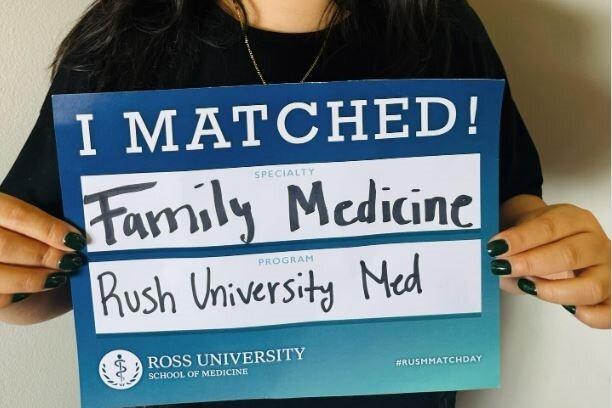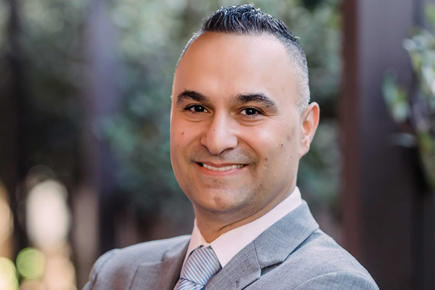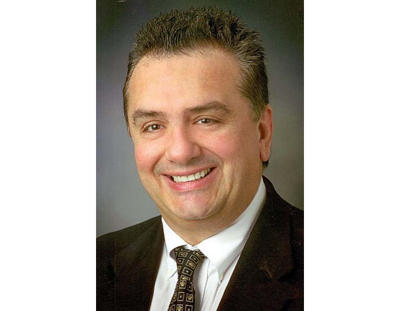While Anita grew up in a medical family – both of her parents are practicing doctors who are strong advocates of preventive medicine and nutritional therapy – she didn’t fully make the decision to follow in their footsteps until late her college career at UC Berkeley. Once she’d made up her mind, however, she didn’t want to waste any time. She began researching alternative options to US medical schools, which quickly led to her finding and applying to RUSM – a decision she described as “one of the best I’ve made in my whole life.’ The reason for this being two-fold: she not only fulfilled her dream of becoming a physician, but she also met her husband, Imran Junaid, MD ’05, while in Dominica.
“I had a wonderful experience on the island,” she said. “It was very peaceful and conducive to studying. I was able to immerse myself in the Basic Sciences, which gave me a strong foundation that prepared me for residency and beyond.”
The couple ended up pre-matching together at UCLA/VA Medical Center in Internal Medicine – which, while unexpected, was a real blessing, according to Anita. After completing their residencies, they both went on to complete fellowships; Anita at UC Irvine (in Endocrinology), and Imran at UCLA-VA (in Allergy & Immunology).
“We were fortunate to be able to do all of our training in Los Angeles together,” she said. “I was not 100% sure where we would end up. I was lucky in that I really clicked with the program director, who eventually became my mentor, and guided me towards my specialty. My husband and I were both offered a spot outside the match.”
After her fellowship, Anita was offered a position at Kaiser Permanente in Los Angeles, where she worked for two years as a practicing endocrinologist and was the head of both the Medical Bariatric Program and the Gestational Diabetes Program.
“I gained a lot of experience at Kaiser and had a wonderful time there,” she explained. “After a few years, we returned to Northern California and went into private practice with my parents – my dad and mom have been in private practice for 40+ years. Two years ago, my husband, who was the Chief of Allergy at Kaiser for many years, joined us as well. We all work together and have three offices in the Bay area. My sister, Dr. Jyoti Bhat, who also happens to be an endocrinologist, is also in practice with us.”
Recently renamed JivaHealth, the Bhat family practice serves a patient population of roughly 1.1 million.
“The meaning of ‘jiva’ resonated because it encompasses what we do, which is tackle health from a comprehensive wellness angle,” Anita explained. “We specialize in diabetes, diabetes-related disorders, and other endocrine disorders, but go beyond simply prescribing medications by looking at the whole patient and also incorporating preventive care, cardiovascular prevention and wellness, and weight management into our treatment approach. By tackling these types of disorders from all of those angles we are able to offer really complete individualized care.”
When asked how it feels to have come full circle, Bhat said, “When you go to medical school you often have an idealistic view of what you want to specialize in and what you want to do. I knew I wanted to focus on diabetes, awareness, and preventive health, but I didn’t have a plan of how I was going to do that at first. I’m fortunate to have had the experiences of both Kaiser, a huge system, as well as private practice, and I can see the pluses and minuses of both. The nice thing about private practice is that you can cultivate the kind of care you want to deliver – high quality care but on your own terms – so it’s kind of the best of both worlds.”
She continued. “What I enjoy most is still in line with what I went into medicine for in the first place, which is to partner with patients and empower them with education about their condition that can help them prevent progression of their disease. Our collaborative approach leads to successful outcomes.”
According to Anita, the lack of awareness about diabetes and its causes is one of the main reasons it continues to be a pandemic.
“Seeking care, especially preventive care, is important” she said. “There’s so much confusion – people simply don’t know the right questions to ask or the right choice to make. As a patient, I can see it being very frustrating trying to navigate that world and figure out what’s right and healthy. Seeing a diabetes specialist or someone who specializes in comprehensive wellness and weight management is the best thing that someone with diabetes can do. It’s not just about treating the diabetes – we need to treat the underlying causes that have led to the development of diabetes in the first place, and prevent progression to other chronic disease states.”



